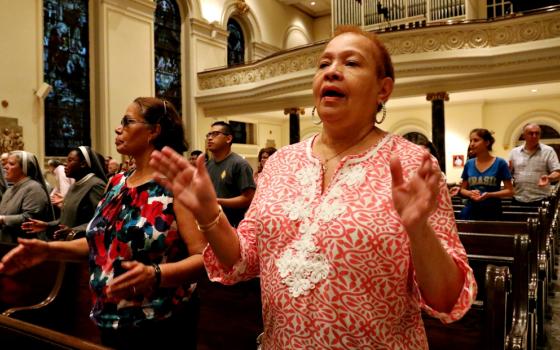The events in Charlottesville, Virginia, earlier this month brought to mind the lyrics of a song in "South Pacific" by Rogers and Hammerstein. It is a song that isn't always on the list of top tunes of that musical. For those of you who may not remember the song, it is sung by a U.S. officer who is falling in love with a young native woman and is struggling with his feelings toward her.
You've got to be taught
To hate and fear,
You've got to be taught
From year to year,
It's got to be drummed
In your dear little ear
You've got to be carefully taught.
You've got to be taught
To be afraid
Of people whose eyes
Are oddly made,
And people whose skin
Is a different shade,
You've got to be carefully taught.
You've got to be taught before it's too late,
Before you are 6 or 7 or 8,
To hate all the people
Your relatives hate,
You've got to be carefully taught.
I found myself saying over and over, you've got to be carefully taught, as I watched the coverage of Charlottesville and the violence began. I was sickened as I saw the bottles being thrown at those who came to stand in nonviolent opposition to the white nationalists, Klan, alt-right. It is hard for me to understand how there are still people who believe that the United States of America is and should be a white nation. Or perhaps I don't want to believe it.
My repulsion only got stronger as I listened to President Donald Trump try to draw a moral equivalency between the two groups and then argue that Robert E. Lee and George Washington were more similar than not. Even though Steve Bannon is no longer on the White House staff, his worldview continues to influence many of Trump's supporters.
It is a worldview well-expressed in that 1949 musical. You've got to be taught to hate and fear.
That teaching happens consciously and unconsciously. I began to reflect: When do we who are in the privileged majority of this country begin to see color as a defining characteristic indicating inferiority? When do we look at noses, lips, hair and body shapes and formulate judgments about what kind of person looks like that? When do we hear grammar and voice intonations as signs of being less-educated and lacking culture?
When do we no longer see individuals but only perceive them as a group that is threatening our way of life? When do we learn that who we are and how we act is normative and should be privileged? When do we learn to be afraid and hate the other?
Who teaches us that? So many people and in so many ways. As the song says, you have to be taught before it is too late ... before 7 or 8. The question for us is: How can we be untaught?
Perhaps it need not be said that it involves what is taught in schools, how the media portrays difference, how churches speak about race and religion. But it has to touch more deeply into our very being. We need to see with new eyes and hear with new ears. We need to take a long, loving look at the real.
I believe that if we become serious about deepening our interior life we can unlearn hatred and fear. Perhaps not totally eradicate it but become keenly aware of what old misconceived idea is trying to take hold of one's actions and thoughts and stop it — transform it — into a more loving response.
This is hard work. Contemplative practice helps us do this. It helps us get in touch with how we are all one. That we are more similar than we are different. It helps us become aware of our biases so rooted in culture and familial beliefs. It helps us surrender to the Divine working within us to teach us who we really are in this planetary community.
We have work to be done if we are to survive and thrive as a loving, relational community of great diversity within our incredibly powerful pluralistic democracy. The challenge is to find how to publicly express outrage at the morally reprehensible, in ways that invite everyone to take a look within and see what fosters hate rather than love among us.
[Nancy Sylvester founded the Institute for Communal Contemplation and Dialogue and has served as its director since 2002. She served in leadership of her own religious community, the Sister Servants of the Immaculate Heart of Mary, Monroe, Michigan, as well as in the presidency of the Leadership Conference of Women Religious. Prior to that, she was national coordinator of Network, the national Catholic social justice lobby.]

